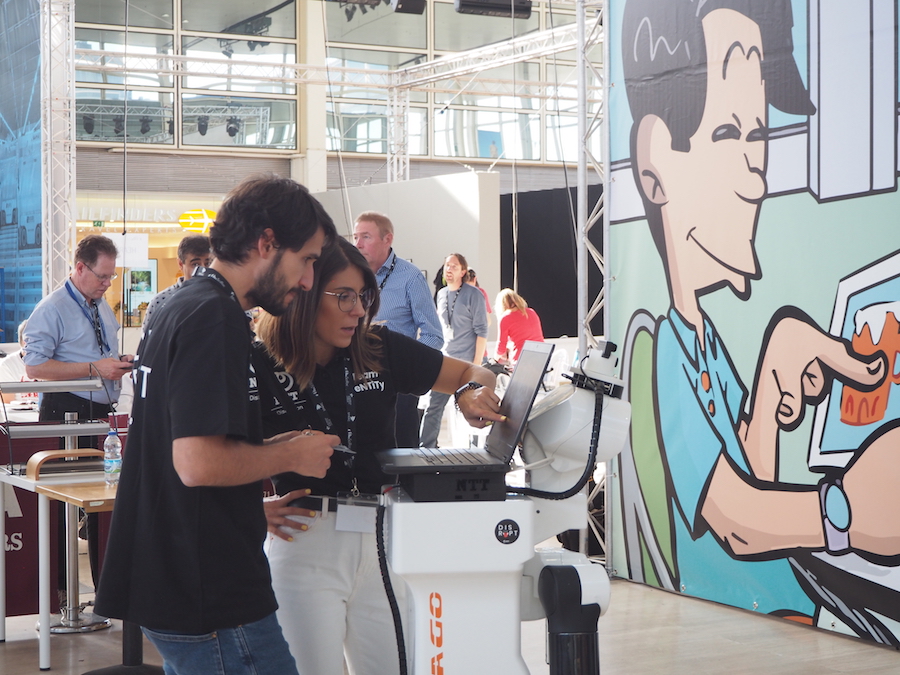
The city of Milton Keynes hosts from the 17th to the 21st of September the European Robotics League – Smart Cities Robotics Challenge (SciRoc Challenge). For the first time, international researchers in robotics and artificial intelligence meet in a shopping mall to demonstrate the state of the art in robotics within the context of smart cities and specifically smart shopping.
The European Robotics League, funded by the European Commission to advance research, development and innovation in robotics and artificial intelligence, is the umbrella for three robotics competitions: ERL Consumer, ERL Emergency and ERL Professional service robots. All three leagues meet every two years in the ERL Smart Cities Robotics Challenge, showcasing how real robots can make our lives better in urban environments.
The Challenge
The SciRoc challenge will be held in the smart shopping mall of the Centre:MK. The challenge focuses on smart shopping and is divided into a series of episodes, each consisting of a task to be performed addressing specific research challenges. In order to accomplish their tasks, robots will have to cooperate with the simulated digital infrastructure of a smart shopping mall. Although the competing robots will face mock scenarios, the environment and difficulties are intended to be as realistic as possible, including the interaction with people from the public.
The episodes are organised into three categories:
Human-Robot Interaction (HRI) and Mobility, focuses on robots able to show social behaviour tasks such as verbal interaction with humans.
Manipulation, focuses on robots able to achieve manipulation tasks.
Emergency, defines tasks addressed autonomously by small aerial robots
The SciRoc consortium has designed the episodes with the collaboration of external experts from research and industry in the different categories.
The five episodes that are part of the Smart Cities Robotics challenge, and have been chosen by the robotics community from a previous list of fourteen are:
Deliver coffee shop orders (E03)
In this episode the robot will assist customers in a coffee shop by taking orders and bringing objects to and from customers’ tables.
The main functionality evaluated in this episode is people perception. Additional side functionalities are navigation, speech synthesis and recognition.
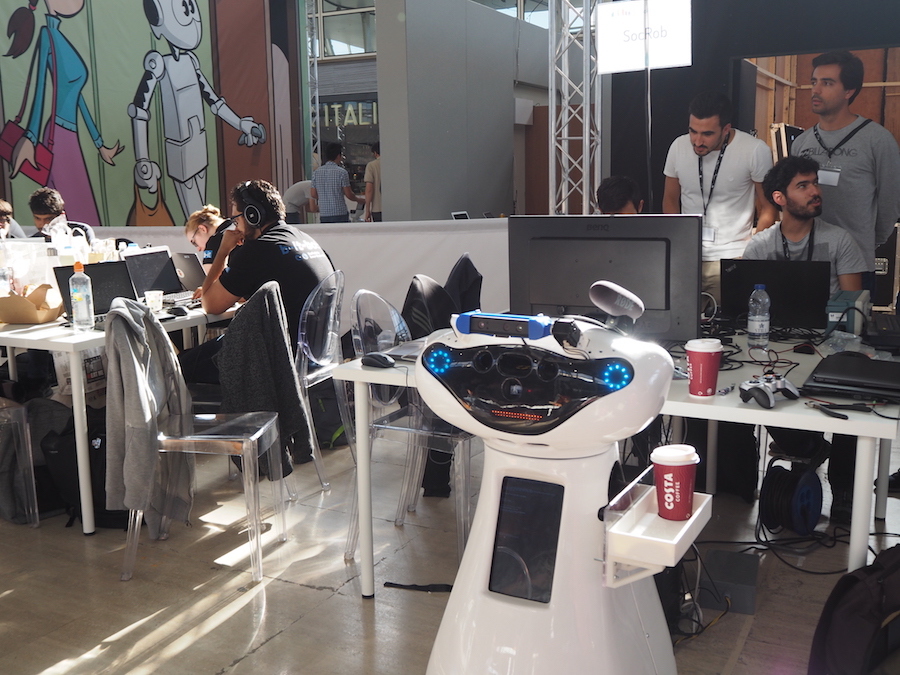
Take the elevator(E04)
The robot must take the elevator crowded with customers to reach a service located in another floor.
The robot should interact with the MK:DataHub to discover which floor it must reach to accomplish its task. The robot must be able to take the elevator together with regular customers of the shopping mall.
Shopping pick and pack (E07)
The robot is in one the booths of the mall. On the shelf of the booth are the goods displayed for sale to the customers.
The customers can place orders through a tablet. The robot must move behind the display and collect the requested packages for the customer, place them in a box, and place the box on a tray where the customer can pick it up.
Open the door (E10)
Doors are ubiquitous in human environments. There are many types of doors, some of which are easier to operate than others for a robot.
In this episode the robot will identify a door, approach it and open it completely within a specified tolerance from 90°.
Fast delivery of emergency pills (E12)
The aerial robot must attend an emergency situation in which a first-aid kit needs to be delivered to a customer.
The robot must be able to fly autonomously to the customer location as fast as possible.
Teams can participate in one or more episodes depending on to their research interests.
The teams
A total of 10 teams from 5 different countries classified to compete in the first edition of the ERL Smart Cities Robotics Challenge.
The teams participating in the SciRoc Challenge 2019 are:
1. SocRob@Home – The Soccer Robots or Society of Robots (SocRob) team is a long-term research project of the Instituto Superior Tecnico, Portugal. Funded in 1998, the team has a broad experience participating in robotics competitions such as RoboCup Soccer, RoboCup@Home, RocKin@Homeand and ERL Consumer Robots. The team has special interest in the topic of HRI and mobility and will participate in Episode 3 – Deliver coffee shop orders.
2. Robotics Lab UC3 – This multidisciplinary research group from the Universidad Carlos III de Madrid, Spain, has previously participated in the ERL Consumer Robots league with one of the TIAGO platforms sponsored by PAL Robotics. The team will demonstrate their robot abilities to interact with humans in the Episode 4 – Take the elevator.
3. Gentlebots – Gentlebots is a team of researchers in robotics from the Rey Juan Carlos University and the University of León, Spain. Their research focus is on software development that allows robots to exhibit intelligent behaviours and they have competed in RoboCup@Home. They will participate in Episode 3 and Episode 4.
4. b-it-bots – The team from the Hochschule Bonn-Rhein-Sieg, Germany, has a broad experience with industrial and domestic robots in RoboCup@Work and RoboCup@Home. Winners of the ERL Professional Robots Season 2018-2019, they will participate in Episode 7 – Shopping pick and pack and Episode 10- Open the door, both episodes involve manipulation tasks.
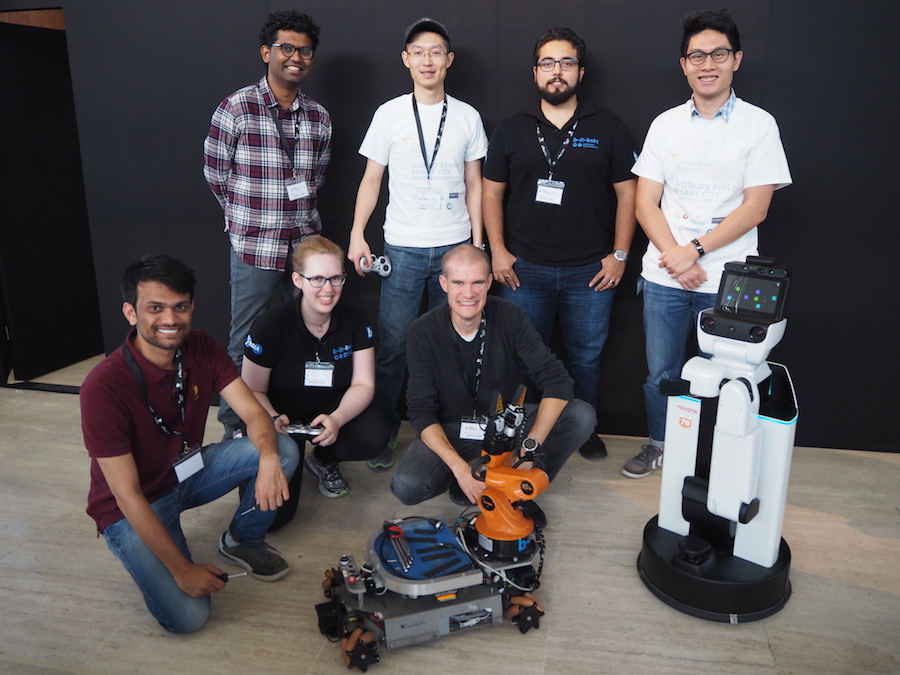
“You learn a lot of things at University, but not always how to apply them in real life. Robotics competitions are the best place for students to use their knowledge in real scenarios and learn from mistakes. In this competition we are solving problems which do not have a solution yet, so the students cannot download a tutorial or watch a YouTube video, they need create their own engineered solutions. This is learning by doing, not learning by listening” says Deebul Nair, b-it-bots Team Manager.
5. Leeds Autonomous Service Robots – The team of the newly established AI group of the University of Leeds, UK, studies long-term decision making and adaptation. They will demonstrate how it is applied in robotics by participating in Episodes 3, 4 and 10.
6. HEARTS – The Healthcare Engineering and Assistive Robotics Technology and Services (HEARTS) team is based in the Bristol Robotics Laboratory, a collaboration between the University of the West of England (UWE) and the University of Bristol, UK. The team was formed to provide an opportunity for students to get hands-on experience of developing assistive robots that are robust and reliable to assist people in a range of situations. The HEARTS will participate in Episode 4 – Take the elevator.
“Participating in the SciRoc challenge gives me the opportunity to use a social robot platform like Pepper in applications different from the ones of my PhD. Pepper is designed for interaction with humans, so it is a good platform for the episode of the elevator in which we are competing” explains Beth Mackey, PhD student and member of the HEART team.
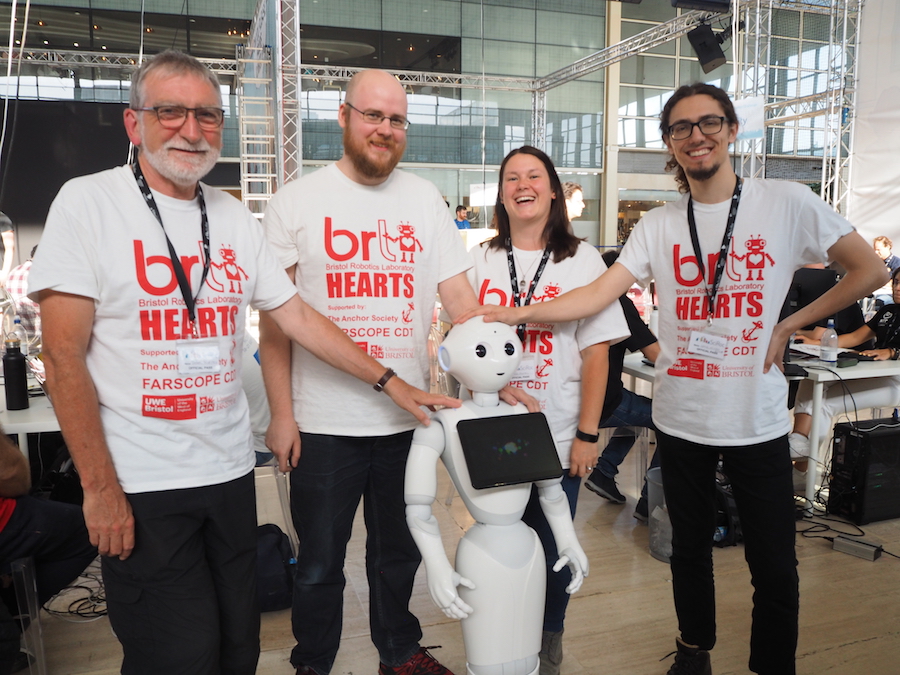
7. UWE Aero – This aerial team of the University of the West of England, UK, is made up of a group of students interested in aerospace projects, focusing in Unmanned aerial vehicles (UAVs). Their backgrounds in aerospace engineering, 3D printing and computer science are a perfect combination to participate in Episode 12 – Fast delivery of emergency pills.
8. CATIE Robotics – The technology transfer center CATIE, France, created in early 2018 this robotics team with the aim of exploring service robotics. CATIE robotics was created in early 2018, and has participated at RoboCup@Home. The team aims to explore service robotics from an application-driven perspective.
“Competitions bring together people from different technical backgrounds under a common goal. They give visibility and the opportunity to be part of a community of experts. Robotics competitions are always very motivating” says Remi Fabre, Team Leader of CATIE robotics.
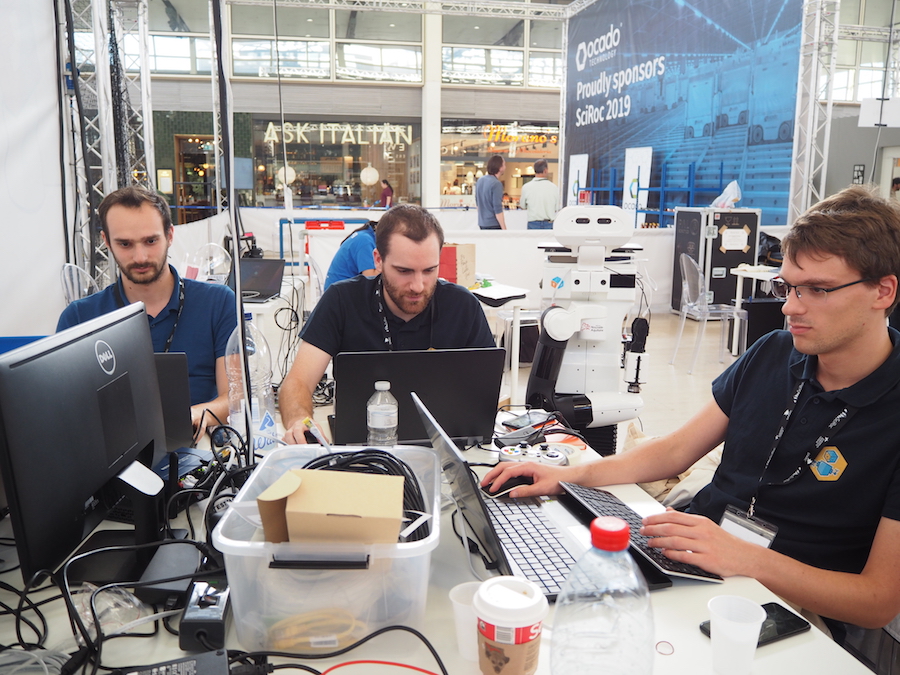
They will apply their knowledge in control and grasping in Episode 7 – Shopping pick and pack.
9. eNTiTy – Everbots – eNTiTy is the team of the R&D department of NTT Disruption, Spain. The team focuses on developing social robotics applications for clients. They first participated in the ERL Consumer tournament in IROS 2018 conference in Madrid.
“Participating in robotics competitions such as the SciRoc challenge help us advance the state of the art in social robotics and put together a good team of researchers. It gives us the opportunity to test different algorithms, such as vision modules, that we can then apply to other products” says Julian Caro Linares, robotics engineer of NTT Disruption.
They will participate with a PAL Robotics TIAGO robot in Episode 3 – Deliver coffee shop orders and Episode 4 – Take the elevator.
Irene Diaz-Portales, computer vision researcher adds “we chose TiAGo because it’s an excellent robotics platform for developing ROS modules.”
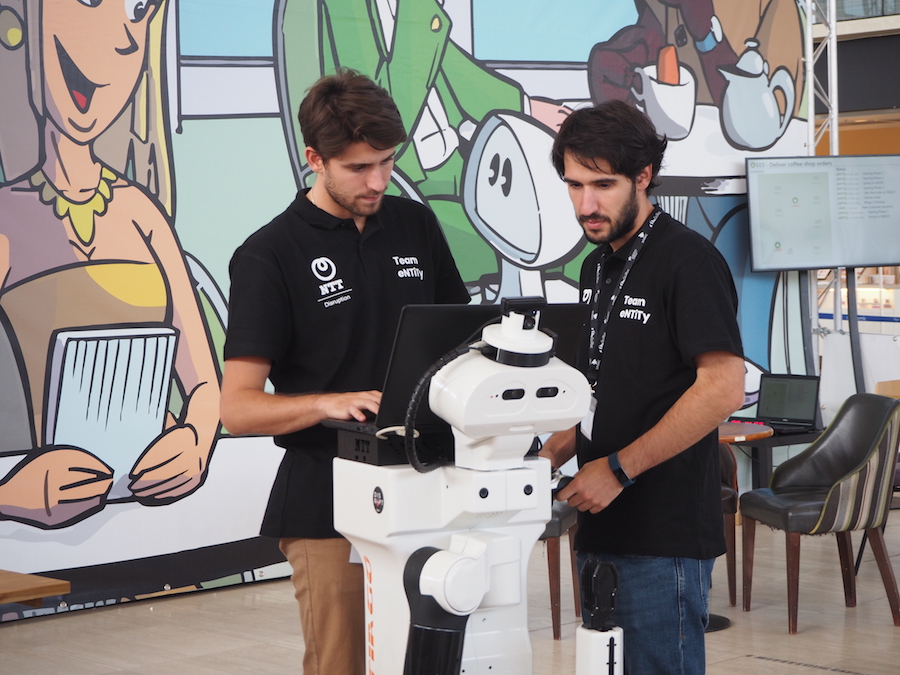
10. TeamBathDrones Research – The TeamBathDrones Research is the University of Bath, UK, competitive autonomous aircraft team. The team is formed of a mixture of lecturers, PhD and undergraduate students from the engineering faculty. Through entering in the ERL Smart cities challenge in the emergency category, they aim to demonstrate the application of collision avoidance by in-flight risk minimisation in Episode 12 – Fast delivery of emergency pills.
Which teams will successfully address the SciRoc Challenge Episodes? Don’t miss the updates starting this week.